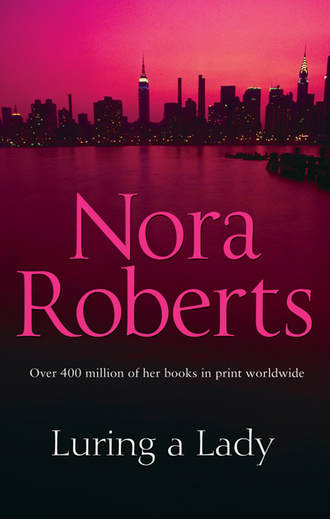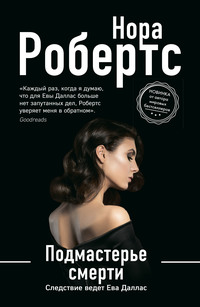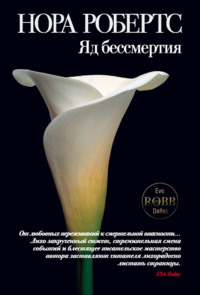
Полная версия
Luring A Lady
When she started toward the entrance, the men shifted to make a path for her. The small lobby was dim and oppressively hot. On this level the windows were apparently painted shut. The old parquet floor was scarred and scraped, and there was a smell, a very definite smell, of mold. She studied the elevator dubiously. Someone had hand-lettered a sign above the button that read Abandon Hope Ye Who Enter Here.
Curious, Sydney punched the up button and listened to the grinding rattles and wheezes. On an impatient breath, she made more notes. It was deplorable, she thought. The unit should have been inspected, and Hayward should have been slapped with a citation. Well, she was Hayward now.
The doors squeaked open, and Mikhail stepped out.
“Did you come to look over your empire?” he asked her.
Very deliberately she finished her notes before she met his gaze. At least he had pulled on a shirt—if you could call it that. The thin white T-shirt was ripped at the sleeves and mangled at the hem.
“I believe I told you I’d look over the file. Once I did, I thought it best to inspect the building myself.” She glanced at the elevator, then back at him. “You’re either very brave or very stupid, Mr. Stanislaski.”
“A realist,” he corrected with a slow shrug. “What happens, happens.”
“Perhaps. But I’d prefer that no one use this elevator until it’s repaired or replaced.”
He slipped his hands into his pockets. “And will it be?”
“Yes, as quickly as possible. I believe you mentioned in your letter that some of the stair railings were broken.”
“I’ve replaced the worst of them.”
Her brow lifted. “You?”
“There are children and old people in this building.”
The simplicity of his answer made her ashamed. “I see. Since you’ve taken it on yourself to represent the tenants, perhaps you’d take me through and show me the worst of the problems.”
As they started up the stairs, she noted that the railing was obviously new, an unstained line of wood that was sturdy under her hand. She made a note that it had been replaced by a tenant.
He knocked on apartment doors. People greeted him enthusiastically, her warily. There were smells of cooking—meals just finished, meals yet to be eaten. She was offered strudel, brownies, goulash, chicken wings. Some of the complaints were bitter, some were nervous. But Sydney saw for herself that Mikhail’s letters hadn’t exaggerated.
By the time they reached the third floor, the heat was making her dizzy. On the fourth, she refused the offer of spaghetti and meatballs—wondering how anyone could bear to cook in all this heat—and accepted a glass of water. Dutifully she noted down how the pipes rattled and thumped. When they reached the fifth floor, she was wishing desperately for a cool shower, a chilled glass of chardonnay and the blissful comfort of her air-conditioned apartment.
Mikhail noted that her face was glowing from the heat. On the last flight of stairs, she’d been puffing a bit, which pleased him. It wouldn’t hurt the queen to see how her subjects lived. He wondered why she didn’t at least peel off her suit jacket or loosen a couple of those prim buttons on her blouse.
He wasn’t pleased with the thought that he would enjoy doing both of those things for her.
“I would think that some of these tenants would have window units.” Sweat slithered nastily down her back. “Air-conditioning.”
“The wiring won’t handle it,” he told her. “When people turn them on, it blows the fuses and we lose power. The hallways are the worst,” he went on conversationally. “Airless. And up here is worst of all. Heat rises.”
“So I’ve heard.”
She was white as a sheet, he noted, and swore. “Take off your jacket.”
“I beg your pardon?”
“You’re stupid.” He tugged the linen off her shoulders and began to pull her arms free.
The combination of heat and his rough, purposeful fingers had spots dancing in front of her eyes. “Stop it.”
“Very stupid. This is not a boardroom.”
His touch wasn’t the least bit loverlike, but it was very disturbing. She batted at his hands the moment one of her arms was free. Ignoring her, Mikhail pushed her into his apartment.
“Mr. Stanislaski,” she said, out of breath but not out of dignity. “I will not be pawed.”
“I have doubts you’ve ever been pawed in your life, Your Highness. What man wants frostbite? Sit.”
“I have no desire to—”
He simply shoved her into a chair, then glanced over where Keely stood in the kitchen, gaping. “Get her some water,” he ordered.
Sydney caught her breath. A fan whirled beside the chair and cooled her skin. “You are the rudest, most ill-mannered, most insufferable man I’ve ever been forced to deal with.”
He took the glass from Keely and was tempted to toss the contents into Sydney’s beautiful face. Instead he shoved the glass into her hand. “Drink.”
“Jeez, Mik, have a heart,” Keely murmured. “She looks beat. You want a cold cloth?” Even as she offered, she couldn’t help but admire the ivory silk blouse with its tiny pearl buttons.
“No, thank you. I’m fine.”
“I’m Keely O’Brian, 502.”
“Her oven doesn’t work,” Mikhail said. “And she gets no hot water. The roof leaks.”
“Only when it rains.” Keely tried to smile but got no response. “I guess I’ll run along. Nice to meet you.”
When they were alone, Sydney took slow sips of the tepid water. Mikhail hadn’t complained about his own apartment, but she could see from where she sat that the linoleum on the kitchen floor was ripped, and the refrigerator was hopelessly small and out-of-date. She simply didn’t have the energy to look at the rest.
His approach had been anything but tactful, still the bottom line was he was right and her company was wrong.
He sat on the edge of the kitchen counter and watched as color seeped slowly back into her cheeks. It relieved him. For a moment in the hall he’d been afraid she would faint. He already felt like a clod.
“Do you want food?” His voice was clipped and unfriendly. “You can have a sandwich.”
She remembered that she was supposed to be dining at Le Cirque with the latest eligible bachelor her mother had chosen. “No, thank you. You don’t think much of me, do you?”
He moved his shoulders in the way she now recognized as habit. “I think of you quite a bit.”
She frowned and set the glass aside. The way he said it left a little too much to the imagination. “You said you were a carpenter?”
“I am sometimes a carpenter.”
“You have a license?”
His eyes narrowed. “A contractor’s license, yes. For remodeling, renovations.”
“Then you’d have a list of other contractors you’ve worked with—electricians, plumbers, that sort of thing.”
“Yes.”
“Fine. Work up a bid on repairs, including the finish work, painting, tile, replacing fixtures, appliances. Have it on my desk in a week.” She rose, picking up her crumpled jacket.
He stayed where he was as she folded the jacket over her arm, lifted her briefcase. “And then?”
She shot him a cool look. “And then, Mr. Stanislaski, I’m going to put my money where your mouth is. You’re hired.”
CHAPTER TWO
“Mother, I really don’t have time for this.”
“Sydney, dear, one always has time for tea.” So saying, Margerite Rothchild Hayward Kinsdale LaRue poured ginseng into a china cup. “I’m afraid you’re taking this real estate business too seriously.”
“Maybe because I’m in charge,” Sydney muttered without looking up from the papers on her desk.
“I can’t imagine what your grandfather was thinking of. But then, he always was an unusual man.” She sighed a moment, remembering how fond she’d been of the old goat. “Come, darling, have some tea and one of these delightful little sandwiches. Even Madam Executive needs a spot of lunch.”
Sydney gave in, hoping to move her mother along more quickly by being agreeable. “This is really very sweet of you. It’s just that I’m pressed for time today.”
“All this corporate nonsense,” Margerite began as Sydney sat beside her. “I don’t know why you bother. It would have been so simple to hire a manager or whatever.” Margerite added a squirt of lemon to her cup before she sat back. “I realize it might be diverting for a while, but the thought of you with a career. Well, it seems so pointless.”
“Does it?” Sydney murmured, struggling to keep the bitterness out of her voice. “I may surprise everyone and be good at it.”
“Oh, I’m sure you’d be wonderful at whatever you do, darling.” Her hand fluttered absently over Sydney’s. The girl had been so little trouble as a child, she thought. Margerite really hadn’t a clue how to deal with this sudden and—she was sure—temporary spot of rebellion. She tried placating. “And I was delighted when Grandfather Hayward left you all those nice buildings.” She nibbled on a sandwich, a striking woman who looked ten years younger than her fifty years, groomed and polished in a Chanel suit. “But to actually become involved in running things.” Baffled, she patted her carefully tinted chestnut hair. “Well, one might think it’s just a bit unfeminine. A man is easily put off by what he considers a high-powered woman.”
Sydney gave her mother’s newly bare ring finger a pointed look. “Not every woman’s sole ambition centers around a man.”
“Oh, don’t be silly.” With a gay little laugh, Margerite patted her daughter’s hand. “A husband isn’t something a woman wants to be without for long. You mustn’t be discouraged because you and Peter didn’t work things out. First marriages are often just a testing ground.”
Reining in her feelings, Sydney set her cup down carefully. “Is that what you consider your marriage to Father? A testing ground?”
“We both learned some valuable lessons from it, I’m sure.” Confident and content, she beamed at her daughter. “Now, dear, tell me about your evening with Channing. How was it?”
“Stifling.”
Margerite’s mild blue eyes flickered with annoyance. “Sydney, really.”
“You asked.” To fortify herself, Sydney picked up her tea again. Why was it, she asked herself, that she perpetually felt inadequate around the woman who had given birth to her. “I’m sorry, Mother, but we simply don’t suit.”
“Nonsense. You’re perfectly suited. Channing Warfield is an intelligent, successful man from a very fine family.”
“So was Peter.”
China clinked against china as Margerite set her cup in its saucer. “Sydney, you must not compare every man you meet with Peter.”
“I don’t.” Taking a chance, she laid a hand on her mother’s. There was a bond there, there had to be. Why did she always feel as though her fingers were just sliding away from it? “Honestly, I don’t compare Channing with anyone. The simple fact is, I find him stilted, boring and pretentious. It could be that I’d find any man the same just now. I’m not interested in men at this point of my life, Mother. I want to make something of myself.”
“Make something of yourself,” Margerite repeated, more stunned than angry. “You’re a Hayward. You don’t need to make yourself anything else.” She plucked up a napkin to dab at her lips. “For heaven’s sake, Sydney, you’ve been divorced from Peter for four years. It’s time you found a suitable husband. It’s women who write the invitations,” she reminded her daughter. “And they have a policy of excluding beautiful, unattached females. You have a place in society, Sydney. And a responsibility to your name.”
The familiar clutching in her stomach had Sydney setting the tea aside. “So you’ve always told me.”
Satisfied that Sydney would be reasonable, she smiled. “If Channing won’t do, there are others. But I really think you shouldn’t be so quick to dismiss him. If I were twenty years younger…well.” She glanced at her watch and gave a little squeak. “Dear me, I’m going to be late for the hairdresser. I’ll just run and powder my nose first.”
When Margerite slipped into the adjoining bath, Sydney leaned her head back and closed her eyes. Where was she to put all these feelings of guilt and inadequacy? How could she explain herself to her mother when she couldn’t explain herself to herself?
Rising, she went back to her desk. She couldn’t convince Margerite that her unwillingness to become involved again had nothing to do with Peter when, in fact, it did. They had been friends, damn it. She and Peter had grown up with each other, had cared for each other. They simply hadn’t been in love with each other. Family pressure had pushed them down the aisle while they’d been too young to realize the mistake. Then they had spent the best part of two years trying miserably to make the marriage work.
The pity of it wasn’t the divorce, but the fact that when they had finally parted, they were no longer friends. If she couldn’t make a go of it with someone she’d cared for, someone she’d had so much in common with, someone she’d liked so much, surely the lack was in her.
All she wanted to do now was to feel deserving of her grandfather’s faith in her. She’d been offered a different kind of responsibility, a different kind of challenge. This time, she couldn’t afford to fail.
Wearily she answered her intercom. “Yes, Janine.”
“Mr. Stanislaski’s here, Miss Hayward. He doesn’t have an appointment, but he says he has some papers you wanted to see.”
A full day early, she mused, and straightened her shoulders. “Send him in.”
At least he’d shaved, she thought, though this time there were holes in his jeans. Closing the door, he took as long and as thorough a look at her. As if they were two boxers sizing up the competition from neutral corners.
She looked just as starched and prim as before, in one of her tidy business suits, this time in pale gray, with all those little silver buttons on her blouse done up to her smooth white throat. He glanced down at the tea tray with its delicate cups and tiny sandwiches. His lips curled.
“Interrupting your lunch, Hayward?”
“Not at all.” She didn’t bother to stand or smile but gestured him across the room. “Do you have the bid, Mr. Stanislaski?”
“Yes.”
“You work fast.”
He grinned. “Yes.” He caught a scent—rather a clash of scents. Something very subtle and cool and another, florid and overly feminine. “You have company?”
Her brow arched. “Why do you ask?”
“There is perfume here that isn’t yours.” Then with a shrug, he handed her the papers he carried. “The first is what must be done, the second is what should be done.”
“I see.” She could feel the heat radiating off him. For some reason it felt comforting, life affirming. As if she’d stepped out of a dark cave into the sunlight. Sydney made certain her fingers didn’t brush his as she took the papers. “You have estimates from the subcontractors?”
“They are there.” While she glanced through his work, he lifted one of the neat triangles of bread, sniffed at it like a wolf. “What is this stuff in here?”
She barely looked up. “Watercress.”
With a grunt, he dropped it back onto the plate. “Why would you eat it?”
She looked up again, and this time, she smiled. “Good question.”
She shouldn’t have done that, he thought as he shifted his hands to his pockets. When she smiled, she changed. Her eyes warmed, her lips softened, and beauty became approachable rather than aloof.
It made him forget he wasn’t the least bit interested in her type of woman.
“Then I’ll ask you another question.”
Her lips pursed as she scanned the list. She liked what she saw. “You seem to be full of them today.”
“Why do you wear colors like that? Dull ones, when you should be wearing vivid. Sapphire or emerald.”
It was surprise that had her staring at him. As far as she could remember, no one had ever questioned her taste. In some circles, she was thought to be quite elegant. “Are you a carpenter or a fashion consultant, Mr. Stanislaski?”
His shoulders moved. “I’m a man. Is this tea?” He lifted the pot and sniffed at the contents while she continued to gape at him. “It’s too hot for tea. You have something cold?”
Shaking her head, she pressed her intercom. “Janine, bring in something cold for Mr. Stanislaski, please.” Because she had a nagging urge to get up and inspect herself in a mirror, she cleared her throat. “There’s quite a line of demarcation between your must and your should list, Mr.—”
“Mikhail,” he said easily. “It’s because there are more things you should do than things you must. Like life.”
“Now a philosopher,” she muttered. “We’ll start with the must, and perhaps incorporate some of the should. If we work quickly, we could have a contract by the end of the week.”
His nod was slow, considering. “You, too, work fast.”
“When necessary. Now first, I’d like you to explain to me why I should replace all the windows.”
“Because they’re single glazed and not efficient.”
“Yes, but—”
“Sydney, dear, the lighting in there is just ghastly. Oh.” Margerite stopped at the doorway. “I beg your pardon, I see you’re in a meeting.” She would have looked down her nose at Mikhail’s worn jeans, but she had a difficult time getting past his face. “How do you do?” she said, pleased that he had risen at her entrance.
“You are Sydney’s mother?” Mikhail asked before Sydney could shoo Margerite along.
“Why, yes.” Margerite’s smile was reserved. She didn’t approve of her daughter being on a first-name basis in her relationships with the help. Particularly when that help wore stubby ponytails and dirty boots. “How did you know?”
“Real beauty matures well.”
“Oh.” Charmed, Margerite allowed her smile to warm fractionally. Her lashes fluttered in reflex. “How kind.”
“Mother, I’m sorry, but Mr. Stanislaski and I have business to discuss.”
“Of course, of course.” Margerite walked over to kiss the air an inch from her daughter’s cheek. “I’ll just be running along. Now, dear, you won’t forget we’re to have lunch next week? And I wanted to remind you that…Stanislaski,” she repeated, turning back to Mikhail. “I thought you looked familiar. Oh, my.” Suddenly breathless, she laid a hand on her heart. “You’re Mikhail Stanislaski?”
“Yes. Have we met?”
“No. Oh, no, we haven’t, but I saw your photo in Art/World. I consider myself a patron.” Face beaming, she skirted the desk and, under her daughter’s astonished gaze, took his hands in hers. To Margerite, the ponytail was now artistic, the tattered jeans eccentric. “Your work, Mr. Stanislaski—magnificent. Truly magnificent. I bought two of your pieces from your last showing. I can’t tell you what a pleasure this is.”
“You flatter me.”
“Not at all,” Margerite insisted. “You’re already being called one of the top artists of the nineties. And you’ve commissioned him.” She turned to beam at her speechless daughter. “A brilliant move, darling.”
“I—actually, I—”
“I’m delighted,” Mikhail interrupted, “to be working with your daughter.”
“It’s wonderful.” She gave his hands a final squeeze. “You must come to a little dinner party I’m having on Friday on Long Island. Please, don’t tell me you’re already engaged for the evening.” She slanted a look from under her lashes. “I’ll be devastated.”
He was careful not to grin over her head at Sydney. “I could never be responsible for devastating a beautiful woman.”
“Fabulous. Sydney will bring you. Eight o’clock. Now I must run.” She patted her hair, shot an absent wave at Sydney and hurried out just as Janine brought in a soft drink.
Mikhail took the glass with thanks, then sat again. “So,” he began, “you were asking about windows.”
Sydney very carefully relaxed the hands that were balled into fists under her desk. “You said you were a carpenter.”
“Sometimes I am.” He took a long, cooling drink. “Sometimes I carve wood instead of hammering it.”
If he had set out to make a fool of her—which she wasn’t sure he hadn’t—he could have succeeded no better. “I’ve spent the last two years in Europe,” she told him, “so I’m a bit out of touch with the American art world.”
“You don’t have to apologize,” he said, enjoying himself.
“I’m not apologizing.” She had to force herself to speak calmly, to not stand up and rip his bid into tiny little pieces. “I’d like to know what kind of game you’re playing, Stanislaski.”
“You offered me work, on a job that has some value for me. I am accepting it.”
“You lied to me.”
“How?” He lifted one hand, palm up. “I have a contractor’s license. I’ve made my living in construction since I was sixteen. What difference does it make to you if people now buy my sculpture?”
“None.” She snatched up the bids again. He probably produced primitive, ugly pieces in any case, she thought. The man was too rough and unmannered to be an artist. All that mattered was that he could do the job she was hiring him to do.
But she hated being duped. To make him pay for it, she forced him to go over every detail of the bid, wasting over an hour of his time and hers.
“All right then.” She pushed aside her own meticulous notes. “Your contract will be ready for signing on Friday.”
“Good.” He rose. “You can bring it when you pick me up. We should make it seven.”
“Excuse me?”
“For dinner.” He leaned forward. For a shocking moment, she thought he was actually going to kiss her. She went rigid as a spear, but he only rubbed the lapel of her suit between his thumb and forefinger. “You must wear something with color.”
She pushed the chair back and stood. “I have no intention of taking you to my mother’s home for dinner.”
“You’re afraid to be with me.” He said so with no little amount of pride.
Her chin jutted out. “Certainly not.”
“What else could it be?” With his eyes on hers, he strolled around the desk until they were face-to-face. “A woman like you could not be so ill-mannered without a reason.”
The breath was backing up in her lungs. Sydney forced it out in one huff. “It’s reason enough that I dislike you.”
He only smiled and toyed with the pearls at her throat. “No. Aristocrats are predictable, Hayward. You would be taught to tolerate people you don’t like. For them, you would be the most polite.”
“Stop touching me.”
“I’m putting color in your cheeks.” He laughed and let the pearls slide out of his fingers. Her skin, he was sure, would be just as smooth, just as cool. “Come now, Sydney, what will you tell your charming mother when you go to her party without me? How will you explain that you refused to bring me?” He could see the war in her eyes, the one fought between pride and manners and temper, and laughed again. “Trapped by your breeding,” he murmured. “This is not something I have to worry about myself.”
“No doubt,” she said between her teeth.
“Friday,” he said, and infuriated her by flicking a finger down her cheek. “Seven o’clock.”
“Mr. Stanislaski,” she murmured when he reached the door. As he turned back, she offered her coolest smile. “Try to find something in your closet without holes in it.”
She could hear him laughing at her as he walked down the hallway. If only, she thought as she dropped back into her chair. If only she hadn’t been so well-bred, she could have released some of this venom by throwing breakables at the door.
She wore black quite deliberately. Under no circumstances did she want him to believe that she would fuss through her wardrobe, looking for something colorful because he’d suggested it. And she thought the simple tube of a dress was both businesslike, fashionable and appropriate.
On impulse, she had taken her hair down so that it fluffed out to skim her shoulders—only because she’d tired of wearing it pulled back. As always, she had debated her look for the evening carefully and was satisfied that she had achieved an aloof elegance.
She could hear the music blasting through his door before she knocked. It surprised her to hear the passionate strains of Carmen. She rapped harder, nearly gave in to the urge to shout over the aria, when the door swung open. Behind it was the blond knockout in a skimpy T-shirt and skimpier shorts.









